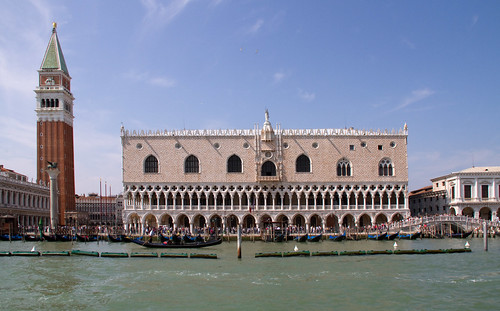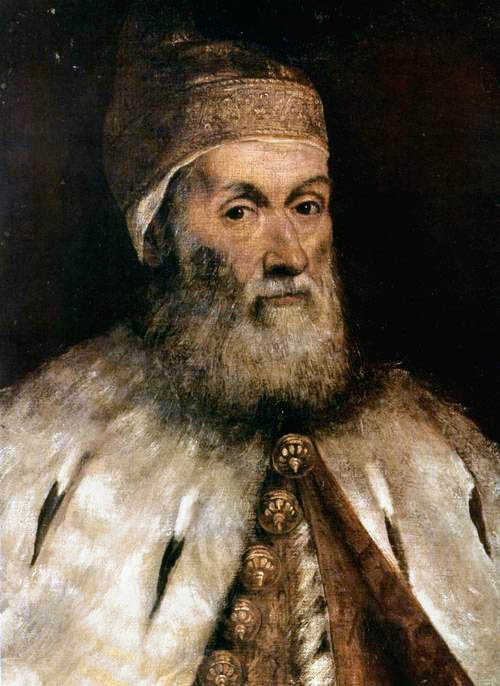Henslowe writes: R at bendo & Richardo the 4 of Marche 1591 ... xvjs
In modern English: Received at Bindo and Ricciardo, 4th March, 1592 ... 16 shillings.
Today, Lord Strange's Men performed Bindo and Ricciardo. The play is lost but we can guess at its content because it was presumably based on the old Italian tale about the architect Bindo and his son Ricciardo. The playwright most likely read it in William Painter's The Palace of Pleasure (1566), an anthology often used by Renaissance dramatists looking for stories. Here follows the story, but I should warn you that it is completely bonkers.

The tale of Bindo and Ricciardo
In 'Novel 48' of William Painter's Palace of Pleasure, Bindo the architect builds a treasure-house for the Duke of Venice. But he incorporates a secret tunnel into the design, and, after the building is completed, he and his son Ricciardo sneak in at night and steal an expensive cup. The Duke notices the theft and installs a trap. When Bindo and Ricciardo break in a second time, Bindo falls into a boiling cauldron. With his dying breath, he tells Ricciardo to cut off his head and bury it to conceal his body's identity and thus prevent the Duke from knowing that Ricciardo was involved.
The rest of the story is about the Duke's attempts to identify the dead thief and entrap his accomplice. At first, the Duke's methods are fairly sensible; he parades the headless corpse around Venice in the hope that the thief's family will be unable to restrain themselves from lamenting. This almost works, because Bindo's widow is distraught, but by devious stratagems Ricciardo manages to silence her.
 |
| Veal: tempting to the lickerous. |
 |
| Girulamo Priuli, Doge of Venice in 1566. He was probably not as silly as the Duke in the story. |
But it almost works. Ricciardo, presumably driven by his lickerous lecherousness, is indeed unable to restrain himself from sneaking into the daughter's bedroom, and "accomplishe[s] the thing he came for" (the daughter's opinion about this is not mentioned, incidentally...). But back in his room, he realizes that she has marked his face with ink. So Ricciardo devises another plan. He returns, steals the ink, and sneaks into the rooms of the sleeping lechers, marking them all with multiple spots of ink. Next morning, when the Duke sees the many-spotted lechers, he realizes that there is no way of identifying the culprit.
But instead of being angry, the Duke laughs and offers a pardon to the culprit, and when Ricciardo confesses that it was he, the Duke allows him to marry his daughter. And so, "Ricciardo, encouraged, proved a very stout and valiant man in such wise almost as the affairs of the whole state passed through his hands, and lived a long time after with the love and goodwill of the whole commonality of Venice."
Blimey. I'm not making this up, you know. If you'd like to read the whole story, you can do so here.
What we learn from this
I'm not sure what the moral of this tale is, beyond "don't get caught". And it's hard to know exactly how the playwright might have adapted this bawdy tale to to the stage. At this time, anti-theatricalist pamphleteers were railing against the immorality of the stage. It's easy to see why, if plays like Bindo and Ricciardo were common.
What's next?
There will be no post tomorrow, because 5th March was a Sunday in 1592 and the players did not perform. Henslowe's Diary ... as a Blog! will thus return on 6th March.
FURTHER READING
Bindo and Ricciardo information
- Christopher Matusiak, "Bendo (or Byndo) and Richardo", Lost Plays Database (2012).
- Martin Wiggins, British Drama, 1533-1642: A Catalogue, vol. 3 (Oxford University Press, 2013), entry 900.
- Sally-Beth MacLean and Lawrence Manley, Lord Strange's Men and their Plays (Yale University Press, 2014) 143-4.
Henslowe links
- Transcript of this page of the Diary (from W.W. Greg's 1904 edition)
- Facsimile of this page of the Diary (from the Henslowe-Alleyn Digitisation Project)
Comments?
Did I make a mistake? Do you have a question? Have you anything to add? Please post a comment below!
Hard to know how a playwright might have adapted this
ReplyDeletetale, you say? Well, yours truly did indeed attempt this and
yes, I can confirm it was a bit tricky! Nevertheless we put on
a jolly good show of 'The Duke and the Architect' here in London.
Fingers crossed, we'll tour it one day!
https://www.ticketea.co.uk/tickets-theatre-the-duke-and-the-architect/
Thank you for the blog! I am enjoying it a lot. I teach early modern British literature in a university in the U.S. It is a brilliant idea to turn Henslowe's Diary into a blog. Also, love your summaries, pictures, funny remarks. Sabina
ReplyDelete